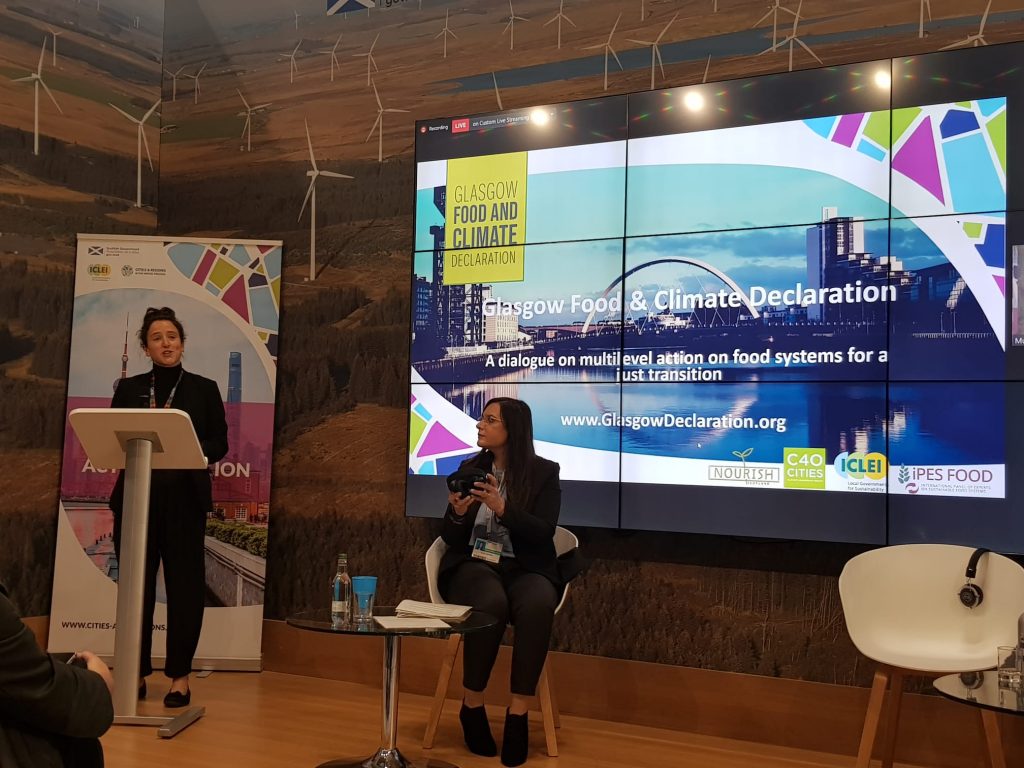Nourish Scotland went to COP26 with the aim of moving food systems up the agenda, carve out space for the voices of local governments and farmers and raise Scotland’s ambition on sustainable food. This COP marked the moment for states to submit new Nationally Determined Contributions (NDCs) to achieving Paris agreement. COP26 was also a critical moment to reflect on the pandemic and lay the foundation for resilient and just societies.

Climate march on the 6th of November
Food at COP26
Food is central to all of this. The global food system contributes 1/3 of emissions, pollutes and drives inequalities. But food can also be part of the solution to the climate and nature crises. Food systems were notably absent from the formal agenda at COP26 this time but became more salient in the side deals and events.
In the first week, there were pledges on deforestation and methane, and the UK led a pledge for urgent action on sustainable food systems. The primary content of this pledge is directing $4bn to agricultural innovation and re-purposing public funds in agriculture. All these pledges focus on agriculture and land use, rather than taking a whole-systems approach.
For example, the agreement on global carbon trading – part of closing the ‘Paris rulebook’ – was an important outcome of COP26. But in the absence of a food systems approach that includes equity and rights, more money will flow into land acquisition for carbon offsets, with the risk of violating land rights and damaging livelihoods and local food cultures.
We need to talk about food, but who talks and how matters
Food consumption and waste should play a critical part in climate action so it was heartening to see healthy and sustainable diets in focus at several COP side events. Yet some of the narratives that permeated diet discussions at COP left us feeling uneasy. Do we really need (or want) one universal approach to sustainable diets? How about decolonising global finance and trade policy to protect diets that have been ‘healthy and sustainable’ for generations? Or to let people define this for themselves in the spirit of food sovereignty?
There can be little doubt that many populations, Scotland included, need to drastically reduce meat consumption (and waste!). But blanket calls for vegan diets exclude livestock farmers and fisherfolk and their important knowledge of coexisting with animals and nourishing their communities. They also ignore diverse nutritional and cultural contexts.
Like food producers, local governments were underrepresented in negotiations where their voices should have been elevated. 80% of food is consumed in cities; and sub-national governments lead the way on integrated policies and actions that tie together food, biodiversity, culture, jobs, justice, health and climate.
Seeds of hope
Despite the lack of ambition in the final Glasgow Pact, there are still reasons to be hopeful. During the two weeks, the climate march, the People’s Summit and the gatherings at Recipes for Resilience and around Glasgow spoke to an immense public commitment to climate action and justice.

On the 6th of November, the Glasgow Food & Climate Declaration reached over 100 local and regional government signatories. Collectively, they call on States to match local ambition and create climate-friendly and just food systems. On ‘cities day’ they were joined by Honduras, the first Member State to sign the Declaration.
Thanks to the persistence of subnational governments including Scotland, ‘multi-level action and collaboration’ made it into the final text. As European co-chair of the Under2 Coalition, Scotland has a key role to play in the coming year of climate action and this must involve delivering on the promise of the right to food.
If local governments are ready to act, so are farmers. Our Fork to Farm dialogues saw over 100 farmers from around the world come together to form connections and make common cause on food and climate policy. Their stories of concern and hope for the land or water they care for could not have been clearer.
The Glasgow Pact, as a first, recognised the importance of the ‘integrity of all ecosystems, including the oceans’. Climate change is rapidly diminishing oceans’ ability to absorb emissions and provide low-carbon nutrition. To keep playing a key role in the transition to sustainable food systems, marine environments and their inhabitants need protection just like peat bogs and forests. It is high time to connect the dots between climate, oceans and food.
Looking ahead
COP resumes in Sharm El Sheikh in a year. In the meantime, Member States have been urged to re-submit more ambitious NDCs. These NDCs must move beyond one-dimensional emission reduction strategies and instead take an integrated approach that includes biodiversity, health, livelihoods, social justice and joy. Governments can’t afford to miss this opportunity.
With Egypt as host, we can expect food to be much higher up on the agenda at COP27. The framing of the conversation is also likely to change. We can expect the focus on food to shift from mitigation to the question of adaptation and loss and damage (food security in a disrupted climate), which is important to the African region. Food sovereignty and gender are likely to be much more central to the conversation too.
In this context, collaborating to elevate the voices of local marginalised groups is ever-important. As we go forward with food and climate action, we continue to be wary of top-down global ‘solutions’ and work to ensure that local government, communities and food producers at the heart of reshaping food systems to better serve people and climate.